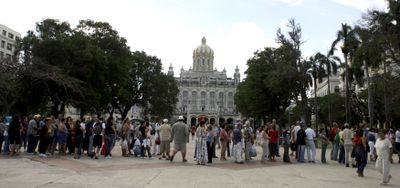Cubans line up to gain Spanish citizenship
Half a million people could be eligible worldwide under newly enacted law

HAVANA – More than 400 Cubans of Spanish ancestry mobbed that country’s stately embassy in Havana on Monday, waiting to apply for citizenship under the newly enacted “law of grandchildren.”
Spain has begun accepting citizenship applications from the descendants of people who went into exile after its brutal 1936-39 Civil War, part of a 2007 law meant to address the painful legacy of the conflict and the ensuing right-wing dictatorship of Gen. Francisco Franco. But a new provision approved Friday also allows anyone whose parents or grandparents were born in Spain but went overseas because of their political beliefs or economic hardship to become Spaniards.
Those accepted do not have to renounce their current citizenship.
Officials in Madrid have estimated that as many as half a million people worldwide could be eligible to become citizens, although it is unclear how many of those are in Cuba. Some 300,000 people in Argentina alone may qualify.
Spanish authorities have asked applicants to use the Internet to set up a consular appointment, and most potential Spanish citizens in countries outside of Cuba were going online instead of heading to their local embassy.
There were a few dozen people lined up at the Spanish Embassy in Mexico City. But that was nothing compared to the tangled and disorganized clumps of would-be Spanish citizens that stretched across a busy avenue and engulfed a small park in Havana, because access to the Web is tightly controlled in this country.
Even those who receive Spanish citizenship must wait for permission from the Cuban government to travel abroad, a process that is often slow and arduous.
Norberto Luis Diaz, 38, was the first person in Cuba to be approved for citizenship under the new provisions. A Spanish consular official signed the forms authorizing his passport, and Diaz excitedly hugged his family members moments later.
Diaz is a cardiologist who began applying for permission to travel to Spain in 2002. Because many Cuban health care workers have to wait six years for approval to head abroad for extended periods, official Cuban permission to leave only came last week, days before the law took effect – making him the first Cuban eligible.
He said he plans to stay in Spain for several months and has already inquired about practicing medicine there, but will one day return to Cuba.
“This is my homeland, too,” Diaz said.